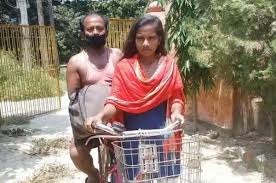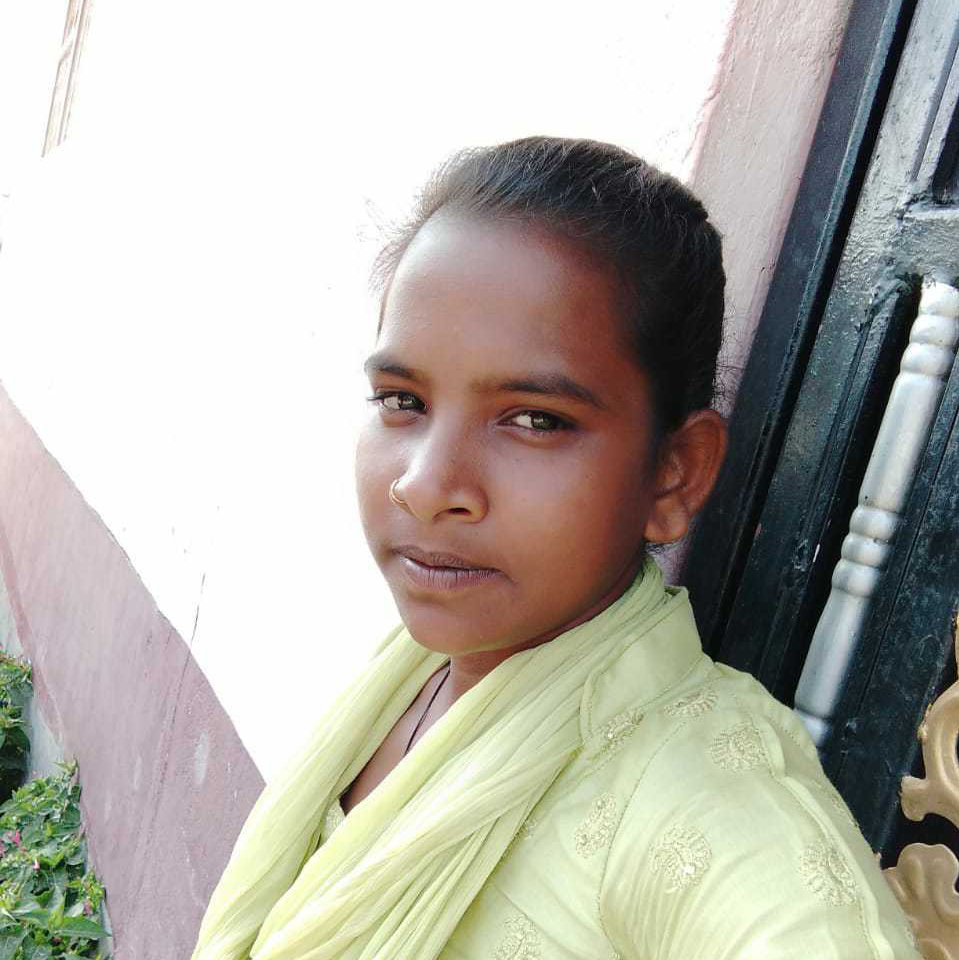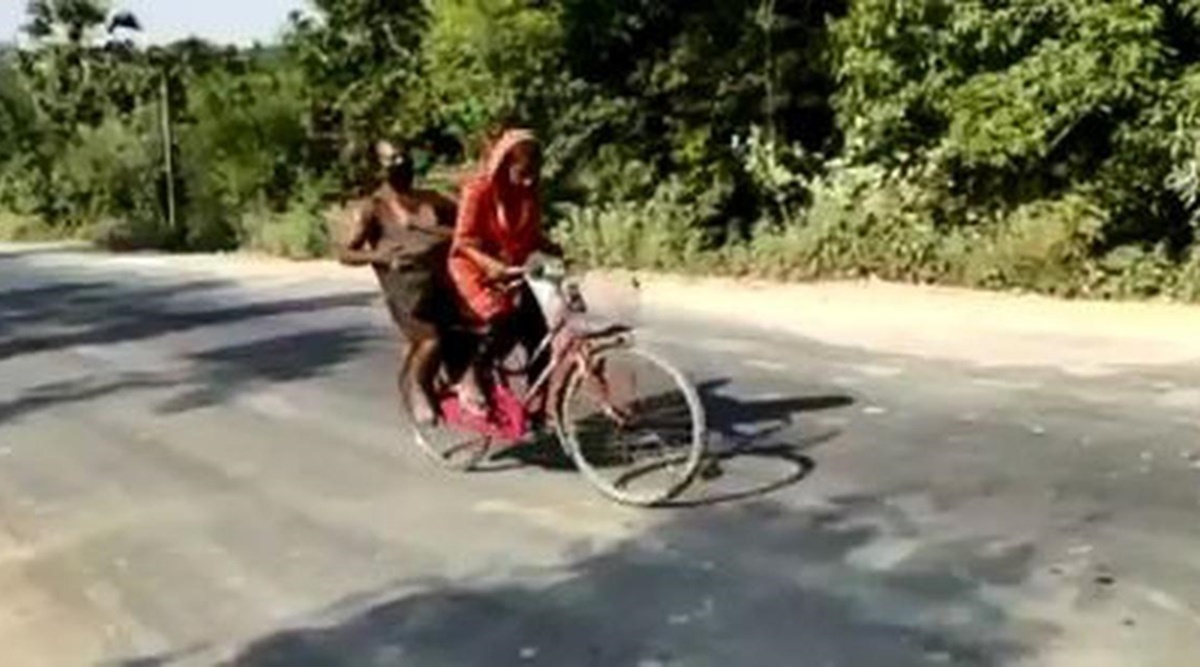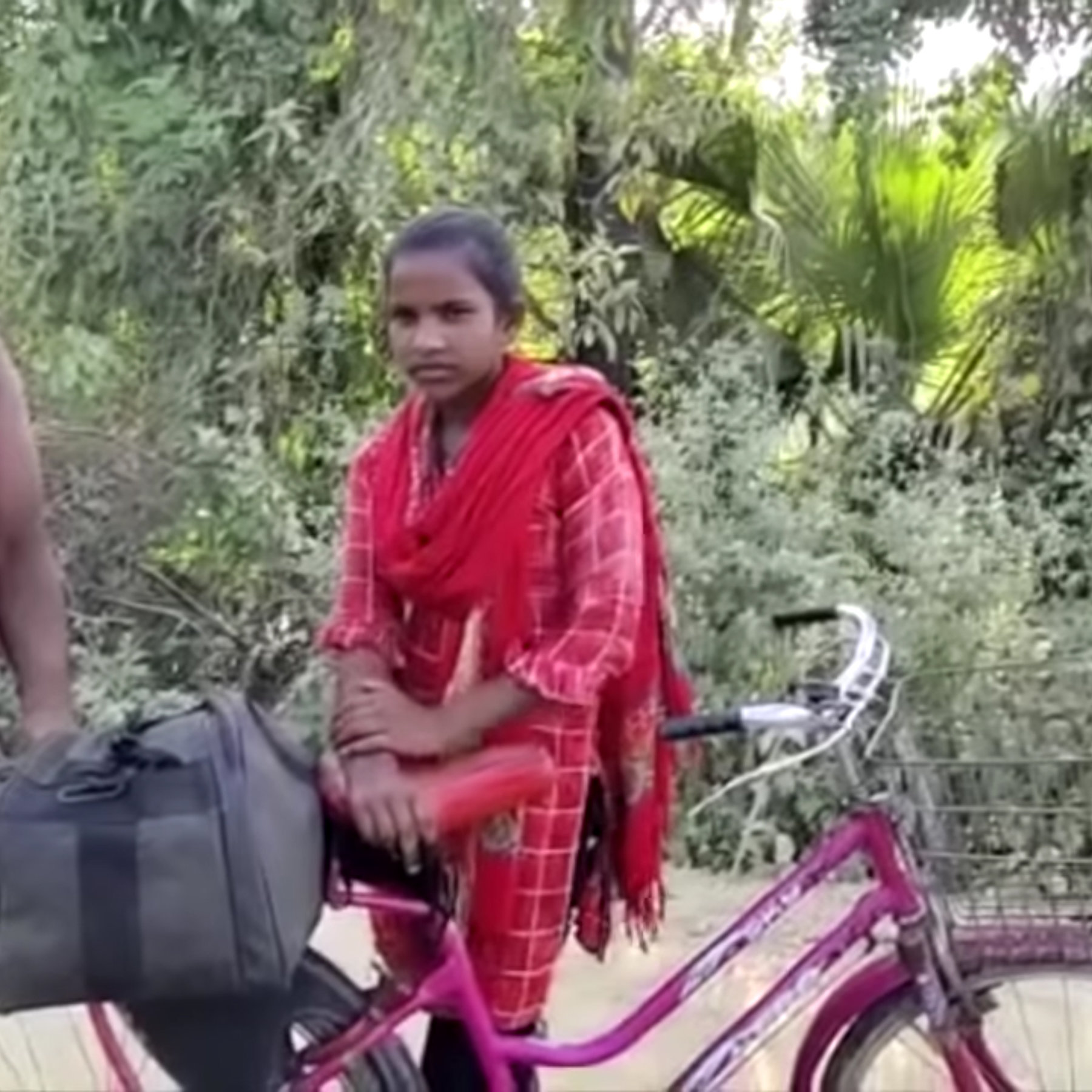
- Good Stuff -
- 6mins -
- 646 views
Indian teen cycles 1200km home with injured father on the bike
The 15-year-old daughter of a migrant worker in India who pedalled 1200km/750 miles to bring her injured father back to their home village has been hailed as a hero and an inspiration.
India’s ‘bicycle girl’ Jyoti Kumari peddles Dad 700 miles, Inspiring a Nation
When her father got injured, 15-year-old Jyoti Kumari used their last $20 to buy a basic bicycle, and peddled him more than 700 miles, or 1200km, to their home village across India — in a heroic, life-saving ride while under coronavirus lockdown. The story of Jyoti Kumari’s epic bike ride made her a media celebrity, prompting praise from Ivanka Trump — and sparked a debate about whether the real issue is the fact the teenager felt she had no other way to get her father to safety.

With their remaining cash, they bought a hot pink girl’s bicycle with no gears and set off
In January, 15-year-old Jyoti Kumari’s father, Mohan Paswan, a tuk-tuk driver, was injured in a traffic accident. He lives in Gurugram, a suburb of New Delhi, India’s capital, and works long hours ferrying passengers on his motorised rickshaw. Paswan sends money home to his wife and children in the eastern state of Bihar, more than 700 miles away.
But after the accident, Paswan couldn’t drive. He needed care. So Kumari took a cross-country train and moved in with her father to nurse him back to health.
Then the pandemic strikes!
The coronavirus has killed some 5,600+ people in India, out of a population of nearly 1.4 billion. But a nationwide lockdown — the biggest in the world — meant that Paswan, even as he healed from his injuries, couldn’t get back on the road. He exhausted what little savings he had. He couldn’t send money home for four months. He could no longer afford the rent on his tiny room, which by then he was sharing with his daughter. By early May, they had the equivalent of about $20 left.
"We were being evicted. We were running out of food," she told local TV. "So I said, ‘Papa, let’s go. Let’s use the last of our money to buy a bicycle and pedal home.’ "
Hot pink bike
At first, Paswan dismissed the idea. Their home is on the other side of the country — some 700 miles away — and he still wasn’t able to pedal because of his injuries.
"I said, ‘How could we possibly go that far — the two of us on one bicycle?’ " Paswan told NPR in a phone interview. "But she convinced me. If we stayed, we would have starved to death. We had to at least try."
So with their remaining cash, they bought a hot pink girl’s bicycle with no gears and a basket affixed to the front. On May 8, they set off — with the father on the bike seat, all their belongings in a duffel bag strapped to the back and his daughter pedaling — while standing up in front of him.
"There were so many things running through my mind. I was scared. Would we make it?" Kumari told another local TV reporter. "My arms and legs were aching, but I got strength and courage from all the people we met along the way."
Source: NPR

Millions of migrants walking home across India
Kumari’s extraordinary story is part of a much bigger picture. For over two months, India’s highways have been clogged with migrant workers trying to get home. During the coronavirus crisis, some 100 million people in India have lost their jobs. Many, like Paswan, became stranded in big urban centres, far from family. Their only chance at survival is to reach their home villages.
But from late March until early May, India’s public transit was shut because of the lockdown. So millions tried to walk home. Some migrants starved to death on the side of the road.
On Monday, Prime Minister Narendra Modi’s government earmarked $2.65 billion in relief for "farmers, hawkers and vendors," a cabinet minister said.
The government also added additional passenger trains to ferry laborers home. But in May, at least 80 people died on those trains. Many of the passengers are so weak and hungry when they board that they can’t survive the journey.
Fortunately for Kumari, food was not a problem on her epic journey. She says people gave her and her father food along the way. They slept on the side of the road. Somewhere in the middle of their journey, a truck driver gave them a lift for about 30 miles, the girl says.
After seven days, on May 15, they rolled into their family’s village of Sirhulli in the eastern state of Bihar. They were met with celebrations, and word of the ride spread quickly.
Kumari said that while she was happy with the recognition, she had not cycled her father home in pursuit of fame. “It was a decision taken in desperation,” she said. For Jyoti, studies are her top priority.
"Earlier, I could not continue my school education because of my family problem and was occupied with the domestic work…but now I wish to complete my matriculation first," she told The Hindu. More than anything else, she says, she’s just looking forward to going back to school.
Source: NPR

Kumari’s story Sparks debate
Kumari’s story even grabbed the attention of US presidential adviser Ivanka Trump, who tweeted praise for Kumari, heralding what she called a "beautiful feat of endurance & love."
However, Indians—from feminists to anti-poverty activists to journalists—accused the president’s daughter of romanticising poverty. They urged her to call out the Modi government instead, for leaving migrants like Kumari and her father in a desperate situation without adequate public aid.
"She did something brave. But it’s something nobody should ever have to do," says Kirthi Jayakumar, a Chennai-based researcher, founder of the Gender Security Project, and one of those who criticised Trump’s tweet. "Who wouldn’t want to save their father? But circumstances made it so difficult, because of the lack of empathy in policymaking — the sheer absence of compassion and understanding of how a policy can impact different communities differently."
Migrant workers like Kumari’s father bore the brunt of the Modi’s government’s early, strict lockdown, which Modi has credited for saving lives in the coronavirus crisis. But some economists and commentators blame the lockdown for exacerbating poverty in a country where half the population earns less than $3 a day.
"India was copying measures that rich countries take to protect public safety and welfare but that low-income countries cannot afford," Ruchir Sharma, chief global strategist at Morgan Stanley Investment Management, wrote in an op-ed in The New York Times over the weekend. "I was in touch with officials in other major emerging countries and none advocated total lockdowns because without the resources to support new armies of the unemployed, closing the economy would only lead to more hunger and death."
On Monday, India lifted a more than two-month-old nationwide lockdown outside of containment zones — neighborhoods with high concentrations of coronavirus infections. But separate state-by-state restrictions remain. Schools are still closed across India. Some restaurants, hotels and shopping malls may reopen June 8.
Source: NPR



